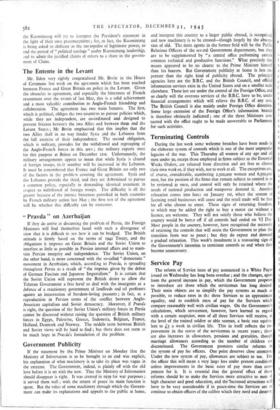The Entente in the Levant
Mr. Eden very rightly congratulated Mr. Bevin in the House of Commons last week on the agreement which has been reached between France and Great Britain on policy in the Levant. Given the obstacles to agreement, and especially the bitterness of French resentment over the events of last May, this is a solid achievement and a most valuable contribution to Anglo-French friendship and collaboration. The agreement has two main features. The first, which is political, obliges the two countries to pursue policies which, while they are independent, are co-ordinated and designed to prevent friction between the two Allies and between them and the Levant States ; Mr Bevin emphasised that this implies that the two Allies shall in no way hinder Syria and the Lebanon from the full exercise of their independence. The second obligation, which is military, provides for the withdrawal and regrouping of the Anglo-French forces in this area ; the military experts meet for this purpose at Beirut on December Mt. Unfortunately, the military arrangements appear to mean that while Syria is cleared of foreign troops, their number will be increased in the Lebanon. It must be remembered that France and Great Britain are only two of the factors in the proble-n covering the agreement. Syria and the Lebanon provide the third, and they are determined to pursue a common policy, especially in demanding identical treatment in respect to withdrawal of foreign troops. The difficulty is all the greater because of the intense bitterness provoked in both countries by French military action last May ; the first test of the agreement will be whether this difficulty can be overcome.






























 Previous page
Previous page